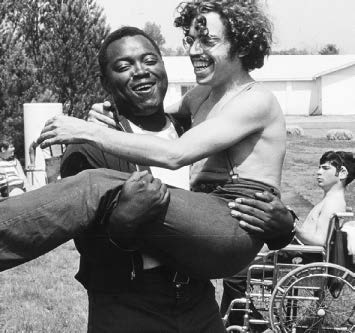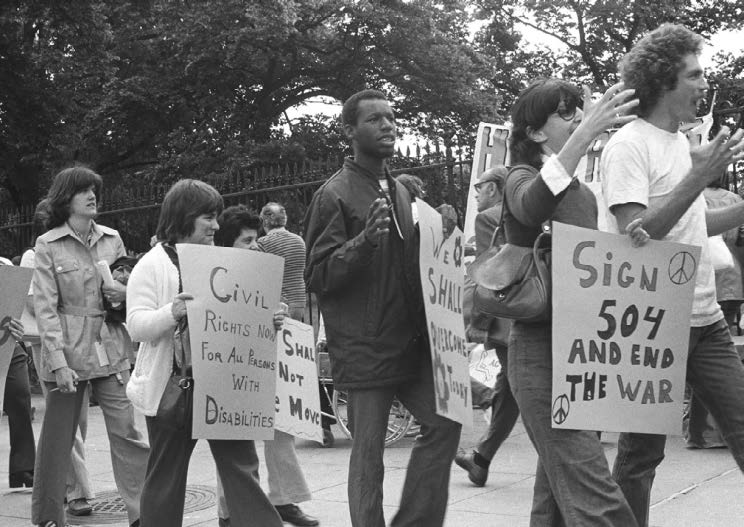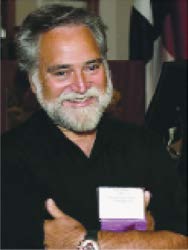ANCORA IMPARO
RICK RADER, MD ■ EDITOR-IN-CHIEF

CARRY THAT WEIGHT: A photo taken at Camp Jened in a scene from Crip Camp: A Disability Revolution. The camp became the incubator for social change, social justice, and social inclusion.
The Rites and Rights of Summer
The disability leaders who got their first taste of "so this is what it feels like" at Camp Jened were motivated to change the world. And though it took almost two decades of persistence, fortitude, and a "storm the castle" backbone, it resulted in the passage of the Americans with Disabilities Act.
"The summer sun was not meant for boys like me. Boys like me belonged to the rain." – Benjamin Alire Saenz
Growing up as a kid in Brooklyn it seemed I always worked. Right up through high school I had jobs as a baby-sitter, I shoveled snow in the winter, made coffee runs at a beauty parlor, bused tables at a delicatessen, worked behind the grill at a hotdog stand (acne came as an occupational hazard), and sold used comic books at our bungalow colony.
In college my horizons blossomed. I cleaned jet planes at Kennedy Airport, stocked the vending machines at our college snack bar, trekked out to San Antonio, and worked at their World's Fair (Hemisphere 68) at a Belgium waffle stand, and conditioned leather saddles and bridles at a local riding academy.
academy. But when it came to me, the summers were the sweet spot for work. There was this great opportunity to spend the summer at an idyllic, serene, lakeside setting, meet girls, play sports all day, and get a bed and food thrown in – all in the hope of getting a nice tip at the end. It was summer camp, and not just "camp," but "sleepaway camp." We got paid about $80 for spending two months as counselors in a number of camps in "upstate" New York. We lived in wood bunks with about 12 "campers." We were responsible for supervising, coaching, disciplining, counseling, overseeing hygiene, insuring letters were written home, and making sure everyone got to play.
The "sleep-away camp" movement had its origins in the 19th century social reformers seeking to give a reprieve to children living in the squalid conditions of industrializing cities. According to Jeri Zeder, "These fresh-air programs blended spiritual, educational, and recreational components." The camp movement flourished and specialty camps sprang up. There were Christian camps, Jewish camps, sports camps, Boy Scout camps, sailing camps, science camps, equestrian camps, YMCA camps, arts/ music/drama camps, language camps, and space camps. The names of the camps, their reputations, their accommodations and supporters began to replicate the competition and prestige of elite colleges. Many of the camps were operated by the same families for generations. There was Camp Unirondack, Camp Kinder Ring, Camp Pathfinder, Camp Beaverbrook, Camp Agawam, Camp Tecumseh, Camp Wyandot, Camp Delmont, and hundreds of others.
As counselors, we were often given special instructions by the parents on the day the kids were dropped off at the beginning of the camp season. "Be sure he learns how to swim," "We would like him to get out of his shell," "Make sure he stops biting his nails," "See if you can keep him from squeezing his pimples," "He needs to lose weight," "He should learn to dance," "He won't tell you but he hates playing the outfield." One of the main messages we got was the subtle message of "Please make sure our child is included." And, to the best of our 18 and 19-year-old maturity, we did. After all, we were looking forward to "Palm Sunday," the last day of Camp when the parents would show their appreciation for our mentoring.

THE MARCH FORWARD: The camp served as the genesis in the disability rights leaders. At the end of the summer they came the realization that the world had stacked the rules against them.
Looking back at those several camping seasons, I don't recall any of the campers having any disabilities. The only assistive medical devices we saw were eyeglasses, braces on teeth, and the occasional sneaker insoles. A few of the campers had bee-sting allergies and one would stutter if he became nervous. No one had diabetes, no one had movement disorders, sensory disorders, emotional or behavioral disorders (other than being spoiled rotten and entitled), communication deficits, there was not a wheel chair in sight, no seeing-eye dogs, canes, crutches, walkers or anything that was employed to assist in inclusion. Just bunks of healthy city kids…challenged with having the time of their lives.
Nothing about the camps I worked at compared to Camp Jened.
Camp Jened was a ramshackle camp in the Catskill Mountains outside of New York City. It was a camp for the "handicapped." a camp staffed by long-haired, pot-smoking hippies who didn't have a clue about people with disabilities. A camp staffed by guys and girls who needed a summer job. A staff that had no specialized training, no preconceived impressions or expectations, a staff that had one goal, which was to give the campers the time of their lives (the same goal that every counselor at every camp had). In addition to a memorable summer vacation for campers with a multitude of disabilities, the camp became the incubator for social change, social justice, and social inclusion.
Crip Camp: A Disability Revolution is a documentary film about the 1971 camp season at Camp Jened. It shares the daily activities, relationships, awakenings and resolutions of both the campers and the counselors. It shows how untrained teenagers (the counselors) relied on their sense of fair play, equality, intuition, and values changed the way people with disabilities could and should be viewed.
ities could and should be viewed. The campers were held to high standards by the staff (who apparently lived their own lives with high standards). If they got tagged out running or crawling to first base, they were out; no do-overs. If their marshmallow fell off of the stick and into the fire, they had to wait to see if there was another one, or get one from a friend. If a girl refused to dance with them, they had to suck it up. Inclusion didn't always look like a Hallmark card. The campers had the freedom and the opportunity to bitch about their parents being overprotective, trying new things and failing and, most of all, calling the shots on how they wanted to spend their time and with who… a concept we call "choice," that has historically been denied to people with disabilities.
Crip Camp served as the genesis for leaders in the disability rights movement. At the end of the summer came the realization that this camp, this "carve out camp" which gave them the taste of how life could and should be, would not follow them back into the city. Back to the world where they would not have a "choice," and that society had stacked the rules against them.
The disability leaders who got their first taste of "so this is what it feels like" at Camp Jened were motivated to change the world. And though it took almost two decades of persistence, fortitude, and a "storm the castle" backbone, it resulted in the passage of the Americans with Disabilities Act.
While I am not the first to celebrate the work, accomplishments and outcomes of these untrained staff, it comes with the realization that, at the time, there were no trained and educated disability support staff.
Their preparation for their success came from the way they lived their own lives, in a natural, open-horizons, self-determined path. So while I continue to create training curriculum, spend countless hours training new and seasoned staff, and evaluate the data resulting from ongoing training programs, perhaps we need to incorporate a bit of their ownership of simply thinking, "Let's give them the time of their lives." My own take-home message from Crip Camp is, marshmallows are bound to fall off the stick; make sure the stick is sharp! •

ANCORA IMPARO In his 87th year, the artist Michelangelo (1475 -1564) is believed to have said "Ancora imparo" (I am still learning). Hence, the name for my monthly observations and comments. – Rick Rader, MD, Editor-in-Chief, EP Magazine Director, Morton J. Kent Habilitation Center Orange Grove Center, Chattanooga, TN